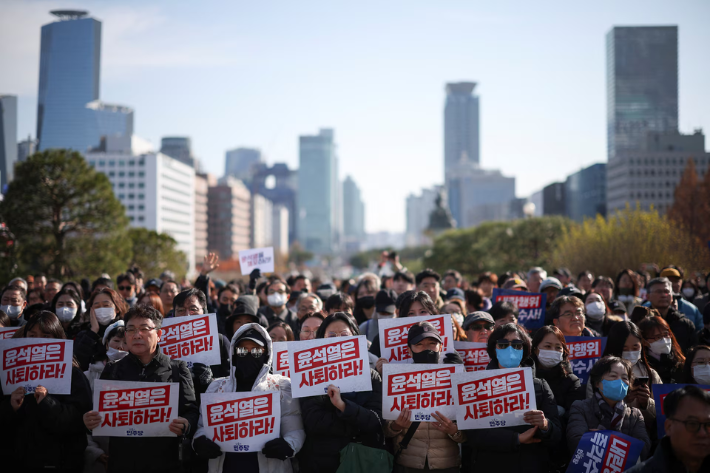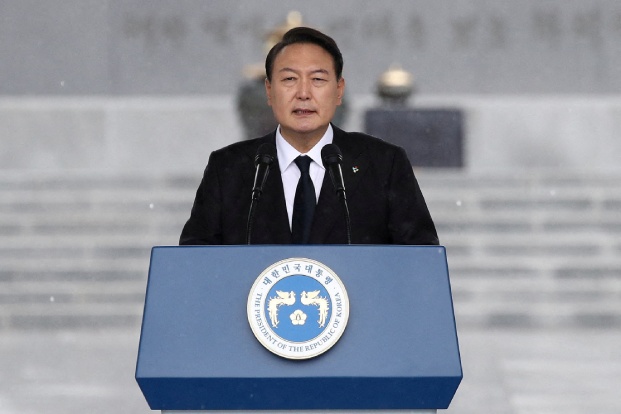South Korea could face months of political upheaval following President Yoon Suk Yeol’s botched attempt to impose martial law during a night of extraordinary drama in Seoul.
Yoon declared martial law – for the first time in more than 40 years – in a live TV address late on Tuesday night, but reversed course six hours later after parliament defied efforts by police and special forces and voted to block the move.
Some 190 of the 300 National Assembly lawmakers gathered to overturn the president’s order within a few hours, and Yoon said shortly after that he would convene a meeting of his Cabinet to accept the National Assembly’s request and end martial law.
ALSO SEE: US Chips ‘Not Safe’ to Buy, Chinese Industry Bodies Claim
Yoon, in an announcement at about 4am local time, called on his parliamentary opponents to to cease their “reckless actions that paralyze the functions of the state, including repeated impeachment attempts, legislative manipulation and budget manipulation.”
South Korea had been in a political stalemate for months, after the liberal opposition Democratic Party won a majority in the parliament in April. Tensions between the two sides escalated when opposition parties decided to cut the state budget and start impeachment proceedings against Cabinet members accused of corruption.
The president, who had sought to make his country a “global pivotal state”, faces severe domestic and international fallout on Wednesday over his action, which analysts said appeared to be a bid to resolve a political standoff with the opposition.
People in South Korea have bitter memories of the country’s authoritarian past and Yoon’s actions appeared to shock the country. His approval ratings have dropped below 20% in recent weeks.
There have been growing calls for the president to resign and six opposition parties have moved to impeach Yoon, after a widespread backlash – including criticism from members of his own party, over his brief imposition of martial law.
South Korea’s Prime Minister Han Duck-soo has pledged to serve the people until the crisis is over and to take “full responsibility for all events leading up to this moment … [and] ensure the nation’s stability.”
MPs look likely to vote in coming days on a bill submitted to the National Assembly that calls for the president to be impeached.
However, the process could take up to three months, according to Kenneth Choi, international editor of The Chosun Ilbo newspaper, who told CNN that parliament would have to appoint new judges because the Constitutional Court doesn’t have the number required to make a ruling on the case – at least six judges must uphold such a decision.
Won plunges, KOSPI down 1.5%
The Bank of Korea called an emergency meeting on Wednesday to discuss how to manage market volatility after the South Korean won fell by 2.9% – to 1,444 per US dollar.
The won recovered some of that loss to 1,422 to the dollar after officials promised “unlimited liquidity” to stabilize the country’s stock market.
The iShares MSCI South Korea ETF, which tracks more than 90 large and mid-sized South Korean companies, dropped by 6% to a year-to-date low, but stocks also recovered some of the initial fall after Yoon’s decision to withdraw troops from the parliament.
The KOSPI was down 1.5% at the close of trading on Wednesday. The biggest losers were heavyweights such as Hyundai Motor (down 2.1%), LG Energy Solution (down 1.4%), and Samsung Electronics (down 1.1%).

Military exercises, talks with allies postponed
Meanwhile, there are fears the political upheaval will deter foreign investors and interrupt diplomatic arrangements.
Swedish Prime Minister Ulf Kristersson, who was due to hold a summit with Yoon this week, will skip the scheduled visit, his spokesperson said on Wednesday.
“Given the recent developments, we have decided to postpone the visit,” the spokesperson said in a statement.
And the United States, South Korea’s main ally, indefinitely postponed meetings of the Nuclear Consultative Group and related tabletop military exercises, a US official said, speaking on condition of anonymity.
The NCG is a signature Yoon effort aimed at having South Korea play a greater role in allied planning for potential nuclear war on the peninsula.
Around 28,500 US troops are stationed in South Korea and it was not immediately clear if other joint military exercises would be affected. A spokesperson for US Forces-Korea did not respond to a request for comment.
The US and South Korean militaries are “in contact”, the Pentagon said on Tuesday, adding there was no request for assistance from Seoul amid the unfolding events.
Pentagon spokesperson Major General Patrick Ryder told a news briefing he also did not believe the martial law declaration had any significant impact so far on the US troops, some of whom work in combined commands with the South Korean military.
A White House spokesperson earlier said the US was not notified in advance of Yoon’s announcement and added: “We are seriously concerned by the developments we are seeing on the ground.”
The martial law declaration cast doubts over a possible visit next week by US Defence Secretary Lloyd Austin. Japanese media reported he was due to meet South Korean and Japanese counterparts as part of trilateral efforts championed by Yoon.
Japan’s lawmaker group on Korean affairs led by former premier Yoshihide Suga cancelled a Seoul visit slated for mid-December, according to Akihisa Nagashima, a special adviser to Japan’s prime minister, who was due to travel with the group.
“The turmoil in South Korea’s domestic politics since last night continues to be alarming,” Nagashima wrote in a post on X.
“It is a tense situation in which the fate of the Yoon administration must be closely watched to see whether it will be able to overcome the fierce public opposition.”
Japanese Prime Minister Shigeru Ishiba earlier told reporters Tokyo was monitoring the situation “with particular and grave interest.”
Duyeon Kim of the Center for a New American Security said Yoon’s international reputation as a symbol of democracy had been ruined.
“The fate of Yoon’s foreign policies remains uncertain and even bleak,” she added.
- Jim Pollard with Reuters
NOTE: A photo and details on impacts of the crisis on the won and shares were added to this report on December 4, 2024.
ALSO SEE:
US Pressing Korean Chipmakers For More China Chip Curbs
China Welcomes ‘New Beginning’ Of Ties with Korea, Japan
North Korean Rocket Carrying Satellite Explodes After Launch
South Korea to Announce $7 Billion Package For Chip Industry
As Korea Mulls Joining US Chip War, China Says ‘Don’t Give In’
US to ‘Indefinitely Extend’ China Chip Waivers For South Korea
Competition in Chip Industry an ‘All-Out War’, South Korea Says
Firm Smuggled 53,000 Banned US Chips to China – BusinessKorea
North Korea Declares Itself a Nuclear State, Vows More Missiles
























